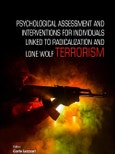Key Features
- Addresses the topic of lone wolf terrorism from multiple angles including psychological aspects, social aspects, philosophical aspects and prevention
- Provides insights into forensic psychiatric methods used to study terrorism
- Includes contributions from several mental health experts
- Explains information in a concise, easy to comprehend manner
- Includes references for further research
Psychological Assessment and Interventions for Individuals Linked to Radicalization and Lone Wolf Terrorism serves as a practical handbook for psychologists, psychiatrists, criminologists, social workers, allied professionals (such as law enforcement officers) and students (in criminology, social science or psychology programs for example) who want to learn about the causes and prevention of terrorism, with a focus on radicalization processes and lone wolf agents.
Table of Contents
Introduction- Radicalization and Lone Wolf Terrorism in a Historical Context
- Theoretical Framework of Analysis
- The Role of Prejudices
- The Existential Positions That Bring to Terrorism
- Radicalization as a State or Trait
- Social Psychology of Radicalization and Terrorism
- Delphi Method, Focus Groups, and Qualitative Research
- The Psychiatric-Political Debate: The Case of Anders Behring
- Breivik
- The Role of Mental Health Professionals
- Consent for Publication
- Conflict of Interest
- Acknowledgments
- References
Chapter 1 Lone Wolf Radicalization and Terrorism: Social and Psychological Analysis Reveal a Diffusion Wider Than Expected
- Introduction
- Lone Wolf, Radicalization and Anomic Societies
- Political Radicalization
- Religious Radicalization
- Radicalization Within the Family
- Corporate Radicalization and Crimes
- Strategies of Radicalization in the Lone Wolf
- The Strategies of Fear and Terrorism
- The Methods for Radicalization
- Violence and Threats
- Adulation, Propaganda, and Folk Culture
- Nature or Nurture in Radicalization
- Suicide Terrorism
- Conclusions
- Consent for Publication
- Conflict of Interest
- Acknowledgements
- References
Chapter 2 Psychology of Radicalization and Lone Wolf Terrorism
- Introduction
- Definition of Radicalization and Lone Wolf
- Ethnographic Research Methods in Radicalization Studies
- Introduction
- Carlo Lazzari, Abdul Nusair and Marco Rabottini
- Carlo Lazzari, Abdul Nusair and Thimmaiah Rajanna
- Carlo Lazzari, Abdul Nusair and Marco Rabottini
- Psychology of Radicalized Thought
- Leadership and Followership
- Sociopsychology of Radicalization
- The Radicalization Path
- The Radicalization of Children
- Radicalized Women
- Discussion
- Recommendations
- Notes
- Consent for Publication
- Conflict of Interest
- Acknowledgements
- References
Chapter 3 Phenomenology and Social Psychology of Lone Wolf
- Radicalization and Terrorism
- Introduction
- Subjects and Methods
- Using Delphi and Focus Groups
- Using the Sign Test for Panel Agreement
- Results
- The Diagnosis of Radicalized Emotions and Behaviors
- Emotions
- Behaviors
- Prejudicial Thoughts
- Radicalized Affiliations
- Weapons
- Being a Hero
- Discussion
- Consent for Publication
- Conflict of Interest
- Acknowledgements
- References
Chapter 4 Preventing Radicalization and Lone Wolf Terrorism:
- Theoretical Models of Prediction in Psychology and Social Sciences
- Introduction
- Methods
- Results and Discussion
- Scenario No 1
- Scenario No 2
- Scenario No 3
- Dealing with Time Series
- Models in Radical Diffusion
- Conclusions
- Consent for Publication
- Conflict of Interest
- Acknowledgements
- References
- Carlo Lazzari, Abdul Nusair and Marco Rabottini
- Carlo Lazzari, Abdul Nusair and Marco Rabottini
Chapter 5 Psychological Assessment and Interventions in Radicalized Individuals
- Introduction
- Psychology of Radicalization
- De-Radicalization
- Conclusions
- Notes
- Consent for Publication
- Conflict of Interest
- Acknowledgements
- References
Chapter 6 Philosophical, Epistemological and Ontological Bases in the Study of Psychology of Lone Wolf Radicalization and Terrorism
- Epistemology and Philosophy of Knowledge in Psychology Of
- Terrorism
- More on Epistemology of Scientific Knowledge in the Study Of
- Radicalization
- What Certainties About the World?
- Philosophy of Research on Radicalization
- What is True Science?
- The Function of Popper and Kuhn in Research
- Ethical Aspects in Preventing Radicalization and Terrorism
- Deontological and Kantian Ethics
- Guiding Ethical Principles in Psychological Studies Of
- Radicalization
- Research Methodology in Radicalization and Lone Wolf
- Phenomena
- Research in Social Psychology of Radicalization
- Paradigms in Research of Radicalization and Terrorism
- Critical Realism in Social Sciences
- Critical Realism Strength and Weakness in Social Analysis
- Critical Realism Application and Improvement
- Social Constructionism and Social Analysis of Radicalization and Terrorism
- Theories in Social Analysis of Radicalization
- Conclusions
- Radicalization Assessment Psychological Test (Rapt-1)
- Consent for Publication
- Conflict of Interest
- Acknowledgements
- References
- Carlo Lazzari, Georgios Mousailidis, Abdul Nusair, Basavaraja Papanna and Ahmed
- Shoka
- Carlo Lazzari, Abdul Nusair and Marco Rabottini
Author
- Carlo Lazzari








